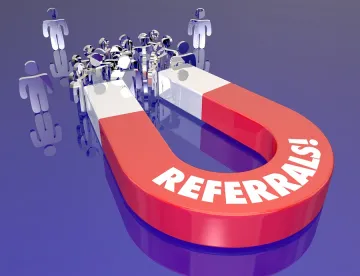With a vast pool of available lawyers, competition to gain clients can be fierce. But with testimonials, a relatively inexpensive marketing tool, you can put your law practice on track to developing a never-ending stream of referrals who want and need your skills and talents.
Testimonials can come from clients, non-clients or staff promoting your work without making you seem like an unattractive braggart. Having someone else say positive things about you and your work is much more credible, believable and valuable.
Research by the Wharton School of the University of Pennsylvania and Goethe University, Frankfurt found that “An analysis of almost 10,000 accounts over a 33-month period showed that those referred by other customers generate higher profit margins, are more loyal and show a higher customer lifetime value.”
Most people feel uncomfortable asking for testimonials and referrals. Even so, it’s a critical skill that you must master. It’s important that you build a relationship with a person before you ask for a referral. This will make it easier for both of you. Also, at this point, they will know more specifics about you as well as the value of your work.
The chief factor in having people give you a great testimonial or referral is that you provide excellent customer service. This doesn’t mean just getting the job done. It means going the extra mile by a very long distance, taking care of both the tiniest details as well as the larger aspects of client care.
You want your clients to rave positively about you and your services. Once the raving commences, politely ask if you may use the comments as a testimonial. If you strike while the iron is hot, it is more likely that you will receive a wonderful testimonial to post on your website and in marketing material.
Not all referrals are by clients. Hinge Marketing found that 81.5 percent of professional businesses received referrals from people who were not clients. That indicates an untapped source of referrals. More about this below.
Types of Testimonials
Hinge identified three types of non-client sources of referrals. Experience-based referrals are those people with whom you have worked. Expertise-based referrals include those who are familiar with your areas of expertise. Finally, reputation-based referrals come from people who know your professional reputation. Identify and establish viable relationships with these groups so that you may add them to your network of referrals.
Treat building a network of referral sources with all due diligence that you would in creating a marketing campaign because that’s exactly what it is. List of professional, personal and family contacts. Listing all of your contacts should leave you with a fairly hefty spreadsheet to organize. Add all contact information that you have, relationships and meaningful little notes that might help you when you connect with your contacts, such as birthdays, anniversaries, hobbies and so forth.
Eric Dewey, a 25-year veteran of marketing and business development, suggests creating three tiers of contacts: high potential, moderate potential, and low potential. High potential referrers include clients and attorneys with whom you have direct professional experience. Dewey suggests you spend the most time and resources on these referrers.
Bankers, accountants, consultants and like professionals who are familiar with your reputation come in as moderate-potential referrers. These people make good referrers because of their own professional reputations.
Low-potential referrers are where the rest of your resources lie. They may need your services or know someone who does.
Reviews Upon Reviews
In addition to referrals and testimonies that you personally receive, many people leave comments on Google Plus, Yelp, Avvo and other review sites. According to Kevin Kent in an August 2015 story, about 83 percent of people first check out these sites when they are searching for an attorney to hire.
ILawyer Marketing found that nearly 60 percent of respondents expected a rating of four stars on these sites before they would hire an attorney and nearly 25 percent of respondents expected five stars before they would hire an attorney. The marketing firm completed a March 2017 study that found that these third-party sites were, in fact, important and unbiased by those writing the study. Therefore, it is essential that you consider these sites when putting together your testimonial marketing strategy.
If you do receive a bad review, and people will post just about anything whether it’s true or not, be sure to reply to it in a well-reasoned, calm fashion. Impress readers with your intelligence and professionalism.
ILawyer also found that quantity of reviews was important. It didn’t matter if a firm has a five-star rating if it only had a handful of reviews compared with a firm that had perhaps four stars but many reviews.
Conclusion
There is no question that people who are researching lawyers trust various kinds of testimonials regarding the value of a particular law firm or attorney. Using this fact to generate leads is a relatively inexpensive, reliable and valuable means to an effective marketing campaign.




 />i
/>i

